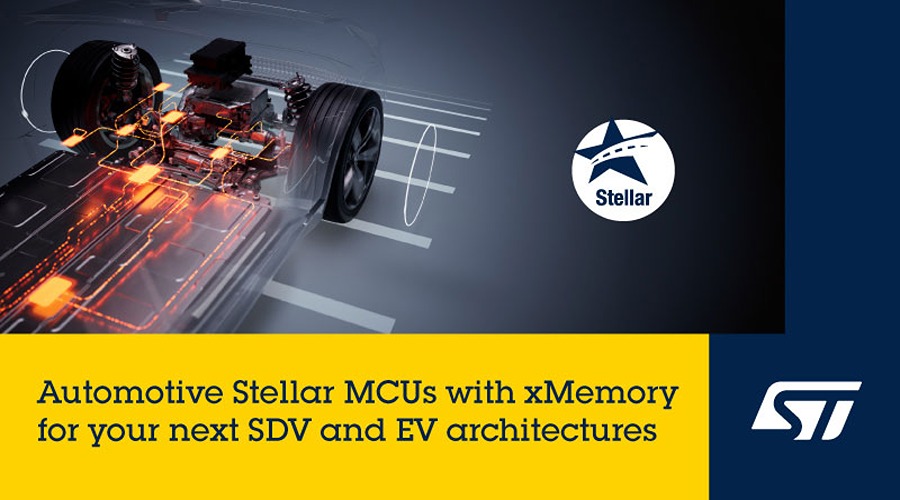
GENEVA, Switzerland, Apr 18, 2025 – STMicroelectronics has introduced Stellar with xMemory, an expandable memory embedded into its “Stellar series” automotive microcontrollers. The feature supports flexible development of software-defined vehicles (SDV) and electrification platforms.
Instead of controlling multiple devices with different memory configurations and related development costs, Stellar with xMemory introduces a single device with expandable memory to support an efficient and cost-effective solution. Starting with this method helps carmakers keep their designs flexible for new innovations in the future. It keeps development costs down and shortens production times with a simpler supply chain. Stellar with xMemory will first appear on the Stellar P6 MCUs, targeting the new drivetrain trends focused on the electric vehicles (EVs). Production is set to begin in 2025.
“ST has developed the ultimate memory technology for the automobile market with the smallest bit cell to meet the endless need for more memory. Stellar with xMemory will streamline the car architectures of tomorrow, making them more cost-effective and significantly reduce development time for carmakers,” said Luca Rodeschini, group vice president and general purpose and automotive microcontrollers division general manager, STMicroelectronics. “This innovative solution enables the same hardware to ensure carmakers have the infrastructure and capabilities with the headroom to continuously innovate their products over time. It provides peace of mind to introduce new innovations in digitalization and electrification, allowing them to stay ahead in the market and extend the lifetime of their vehicles.”
“With the embedded Phase Change Memory (PCM) technology, Stellar offers a robust and flexible memory concept to create highly performant, adaptable microcontrollers for automotive usage. The technology provides application advantages compared to other memory technologies, such as RRAM and MRAM,” said Axel Aue, vice president, Bosch.
“By choosing an extensible MCU like Stellar with xMemory, engineers can avoid costly hardware redesigns to support software features. As software inevitably grows, whether during the initial development or through post-launch OTA updates, the same platform can be upgraded in the field, significantly reducing time-to-market and maintenance costs. A solution like Stellar with xMemory also enables simplified logistics and bill of material efficiency,” said Anshel Sag, principal analyst, Moor Insights & Strategy.
How it works
Carmakers need to integrate software and hardware to reuse parts across platforms, extend vehicle life, and enhance digital features. As software complexity increases due to added features, regulations, AI, machine learning, and over-the-air (OTA) updates, memory becomes a constraint. ST’s xMemory allows additional memory to be added during development or after deployment, allowing application upgrades.
Selecting the appropriate MCU at the start of the SDV lifecycle ensures adequate on-chip memory for future software needs. Over-specifying memory increases costs, while under-specifying may lead to switching to higher-memory MCU later, increasing cost and delay.
Stellar MCUs with xMemory are priced competitively to bring additional savings, simplify the OEM supply chain, and speed up time to market. They extend product life and allow reuse across projects, reducing time for qualification.
High-Density PCM xMemory for Automotive MCUs
ST has been at the forefront of the transition from Flash to eNVM technology in automotive MCUs, introducing the first 28nm eNVM qualified for automotive applications, which is at the core of the xMemory. ST’s embedded Phase-Change Memory (ePCM) has the power, performance, area (PPA) index of NVM technologies such as RRAM, MRAM, and Flash.
PCM, built on 18nm and 28nm nodes, delivers twice the memory density of other technologies by using the industry’s smallest eNVM cell size.
The latest-generation PCM technology will be available on all upcoming Arm-based Stellar P and G automotive MCUs. The Stellar family focuses on automotive applications and simplifies vehicle electrical systems for increased power, flexibility, and safety. The portfolio includes Stellar Integration MCUs (Stellar P and Stellar G series) for centralized zone and domain controllers and body applications. These MCUs consolidate the functions of multiple, separate communication and control ECUs. The Stellar Electrification MCUs (Stellar E series) are designed to control EV traction-module power converters.
Source: STMicroelectronics
About STMicroelectronics

STMicroelectronics, established in 1987 through the merger of Italy’s SGS Microelettronica and France’s Thomson Semiconducteurs, is a global semiconductor company headquartered in Geneva, Switzerland. The company offers a range of products, including analog chips, discrete power semiconductors, microcontrollers, and sensors, serving industries such as automotive, industrial, personal electronics, communications equipment, and computers. In 2023, STMicroelectronics reported revenues of $17.3 billion, with over 50,000 employees worldwide and offices in 40 countries. The company is committed to sustainability, aiming for carbon neutrality in scope 1 and 2 emissions, and partially scope 3, by 2027.
